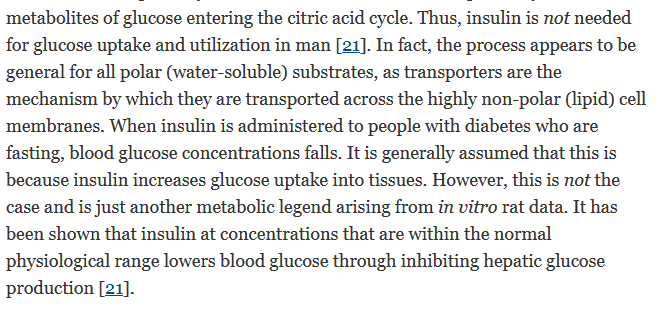A very interesting paper:
Something I did not know (hepatic = liver):

I had understood that increasing insulin means blood sugar would be “pushed” into cells. It never occurred to me that production by the liver would, instead, be turned off.

A very interesting paper:
Something I did not know (hepatic = liver):

I had understood that increasing insulin means blood sugar would be “pushed” into cells. It never occurred to me that production by the liver would, instead, be turned off.
I always thought it was both. As Bikman says, excess insulin both inhibits gluconeogenesis and ketogenesis in the liver and signals muscle to metabolise glucose instead of fatty acids, and signals adipose tissue to store fat, rather than release it to be metabolised. And of course, with a high-carb diet, glucagon drops, so as not to encourage either gluconeogenesis or ketogenesis.
That sounds reasonable. At some point, I’ll have to look at ref 21 to see what it says, too.
“Insulin is not needed for glucose uptake…” So if I decide to consume a glucose based drink during long runs, I’d be doing myself favour? Glucose goes straight tp the muscles I believe.
I’m not so sure about that. It’s not true across the board, at any rate. Glucose uptake by the brain definitely requires insulin. Moreover, it is insulin, responding to elevated serum glucose, that signals muscles to take up glucose to metabolise, and adipose tissue to store it as triglycerides. That is one of insulin’s main jobs.
The body needs serum glucose to remain in a certain range. Any higher level is damaging, hence the insulin response to put the body in sugar-burning mode, to get rid of it. And of course, fat-burning is inhibited, so all the excess glucose will get metabolised.
When cells start down-regulating their insulin receptors in self-defence, the pancreas has to secrete even more insulin to deal with the excess glucose. That is the beginning of insulin-resistance and is the point at which the late Dr. Joseph Kraft believed we should actually start calling it diabetes. As it is, we wait until insulin-resistance becomes so great that glucose control starts to fail, before calling it diabetes.
Glucose is definitely needed…for something, otherwise the body wouldn’t produce it even while keto.
I think the article was just saying that even in the absence of insulin, cells will take glucose up. One would think that insulin could be helpful, though, such as taking in carbs during or after exercise. Though I’ve often wondered how much products, such as whey protein, with near zero or zero carbs but that cause a high insulin response would help with taking in glucose after exercising, as compared with just carbs. Not sure how to test that, and I’m sure glucagon would play a role too.
There are certain cells and organs that need glucose. Red blood corpuscles lack mitochondria, so they must have glucose to live. The brain apparently needs some, though it can do nicely on ketones for most of its energy needs.
Benjamin Bikman seems to have backed off from casting complete doubt on the idea that the brain must have glucose. In the last couple of interviews I’ve watched, he seems to be saying that the brain does need it. Though it’s definitely less than the 130 g of glucose that Cahill estimated.
Brain cells have mitochondria, but Georgia Ede says that certain parts of astrocytes (the long, extended connectors) are too narrow to hold mitochondria, and therefore they need glucose.
There are also other cells and/or organs that apparently need glucose, too, but I forget what they are. So much for keto clarity, huh? 